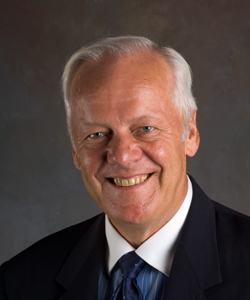Pondering and Heartfelt Praise
By David Lyle Jeffrey
http://www.forwardinchrist.org/
December 24, 2014
Can any praise be worthy of the Lord's majesty? So begins the Confessions of Augustine of Hippo.
Given the limitations of the human mind and skill, the answer to this rhetorical question is obviously 'no.' Yet, as Augustine immediately points out, there is something profoundly unsatisfactory in this necessary answer. Deep in the human heart stirs an undeniable yearning to praise what is most praiseworthy. What could be found more worthy of our praise than the beauty of Creation and the gift of life itself? Only one gift -- the Lord himself, the Giver of life. Thus, Augustine concludes, we cannot be other than restless in the world until we have found a way to give thanks, to celebrate the glory of the Lord. Before he can finish his meditation on the question he has broken into prayer and praise, addressing now not the reader but God directly, saying "you made us for yourself and our hearts find no peace until they rest in you."
What follows in Augustine's beautiful book is a series of meditations, coupled with self-examination and reflection on his own life. Following his conversion to Christ, he writes in order to understand--and enable us to understand-- the hand of God's providence in all he has experienced. His book has become a model for a type of Christian meditation we think of as spiritual autobiography, a recollection in gratitude for God's mercy, for his providence not only in Creation and the life of the world generally, but personally, in one's own life in particular. As a prototype for such writing, Augustine's book becomes a 'confession' in several senses; he acknowledges his sinful past, including his youthful, self-centered ingratitude, but he also tells gratefully what God has wrought in his life to bring him to spiritual health. At a third level, he declares himself as a Christian, 'confessing' the faith of all the Church, all those who have been redeemed of the Lord and 'say so,' bearing witness in the world.
That is one model for Christian meditation. There is another, and we find it growing up in the prayer lives of gifted, often visionary, artistic souls, most of whose extant work tends to take the form of deep reflection on the mysteries of the faith, those events in the life of Christ especially which ground and shape the prayer, praise and worship of the Church collectively. Here is where we find the special praise of mystics, spiritual writers, poets and painters, creating, by means of meditation on the life and ministry of Jesus, forms and acts of worship whose beauty is such that we who attend to them are moved ineluctably to praise God not only for his Creation, or for his transformation of a particular life by grace, but for the tender and loving restoration of all the world to himself through Jesus.
In Jesus, God incarnate, born of Mary, we may find a focus for praise of the Lord's majesty which is less immediately concerned with the self, with what God has done for us, and more devoted simply to God, to the 'face of God' revealed in Jesus, his words (davarim) and his deeds (davarim--in Hebrew effectively the same sound). The desire expressed in such works, whatever their medium, is typically for intimacy with the Lord, especially intimacy in prayer and worship. In great works of Christian art in this vein we find gratitude caught up with joy unspeakable, yet which must speak, lest the very stones cry out. This type of speaking is not usually philosophical; rather, it is often more like the speech of a lover, or of a grateful Beloved, lyrical and effusive. Yet this does not mean, as we shall see, that it lacks theological depth and richness of insight.
Paradoxically, perhaps, these intense and lyrical mediations of the poets and painters can offer us both a form of knowledge and a way of knowing. When we think of how Christians understand the gospels, for example, we readily recognize that reflection on the texts, whether in sermons or biblical commentaries, is helpful to maintaining the narrative as well as theological coherence in which we hold the story of salvation. Because, as Augustine said elsewhere, we pretty much are what we remember; our shared memory of what God has done for us in Christ Jesus, especially in the accounts of Jesus' life in the gospels, forms the identity of an authentically Christian community of faith.
Historically, the poets (including hymn-writers) and painters have had a significant role to play in our corporate understanding of the Scriptures, for they too have been commentators, close readers of the text. Also they are bearers--and shapers--of the shared memory of the Church. On occasion, artists see exquisite details, things of profound spiritual significance that professional commentators and theologians have missed. Often these are intimate insights, observations of the Beloved, reflecting the deeper understanding of a lover who attends not just to command or to a form of argument, but to manner as well as matter, to voice, mood, intonation and inflection, to language of the body as a mirror of the soul.
Such moments of insight and intimacy, I think, can be for us a well-spring of ever more grateful praise. But let us acknowledge that it is the praise itself that God seeks; the form of it, a prayer, a poem, a painting isn't the important thing. Nor, as beautiful as some poems and images are, should we imagine that they are somehow the definition of what is "worthy of the Lord's majesty." We can certainly be helped up to higher ground by G.F. Handel's "Messiah," the 'Annunciation' of Robert Campin, or by Henry Vaughan's exquisite meditation, "The Dwelling Place," but should not think that these great works of art offer definitive answers to Augustine's rhetorical question. When a father or mother receives from the hand of their little child a scrambly crayon impression of who knows what (and is wise enough not to inquire too deeply), that loving parent does not judge worth by the quality of the execution. So it is, I think, with our heavenly Father; whenever a Handel, Campin or J.S. Bach lays down their best work, ad maiorem gloriam Dei, God receives it in love for what most essentially it is, the loving gift of a grateful heart. And--if you will forgive a homely analogy-- he hangs it on his fridge.
Not in a disordered worship of art or artists, then, but in gratitude for the Artist who made us variously in his image, each in our own way able to praise his majesty, we should rejoice in the praises of God's people reflected in works for worship at this season of the liturgical year.
This story was first published in Forward in Christ and is reposted with permission.
 David Lyle Jeffrey is Distinguished Professor of Literature and Humanities at Baylor University since 2000 and Guest Professor at Peking University. Jeffrey teaches courses on medieval literature, the Bible as literature, medieval exegesis, biblical hermeneutics and literary theory, biblical tradition in the arts, art and biblical theology, literature and philosophy, and aesthetics.
David Lyle Jeffrey is Distinguished Professor of Literature and Humanities at Baylor University since 2000 and Guest Professor at Peking University. Jeffrey teaches courses on medieval literature, the Bible as literature, medieval exegesis, biblical hermeneutics and literary theory, biblical tradition in the arts, art and biblical theology, literature and philosophy, and aesthetics.














